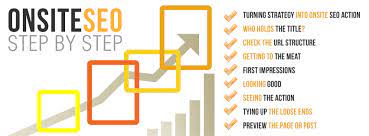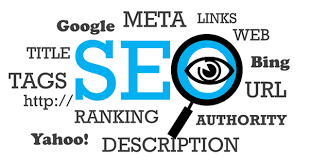The Importance of Onsite SEO for Your Website
Search Engine Optimization (SEO) is crucial for improving your website’s visibility and ranking on search engine results pages. While offsite SEO tactics like link building are important, onsite SEO plays a significant role in optimizing your website for search engines.
What is Onsite SEO?
Onsite SEO refers to the optimization of elements on your website to improve its search engine rankings. This includes optimizing your website’s content, meta tags, headings, images, URL structure, and internal linking.
Why Onsite SEO Matters
Effective onsite SEO can have a direct impact on your website’s visibility in search engine results. By optimizing your website’s content and structure, you make it easier for search engines to crawl and index your site, leading to higher rankings for relevant keywords.
Key Elements of Onsite SEO
- Keyword Optimization: Use relevant keywords strategically in your content, meta tags, and headings to signal to search engines what your website is about.
- Optimized Meta Tags: Write compelling meta titles and descriptions that accurately reflect the content of each page.
- User-Friendly URLs: Create clean and descriptive URLs that are easy for both users and search engines to understand.
- Quality Content: Produce high-quality, original content that provides value to your audience and incorporates relevant keywords naturally.
- Internal Linking: Link internally between related pages on your website to improve navigation and help search engines understand the structure of your site.
Conclusion
In conclusion, onsite SEO is a critical component of any successful digital marketing strategy. By implementing best practices for onsite optimization, you can enhance your website’s visibility, attract more organic traffic, and ultimately achieve better results in search engine rankings. Invest time and effort into optimizing your website onsite to reap the benefits of improved search engine performance.
8 Key Benefits of Onsite SEO for Boosting Your Website’s Performance
- Improves website visibility on search engine results pages
- Helps attract targeted organic traffic to your website
- Enhances user experience by optimizing content and structure
- Increases the likelihood of higher search engine rankings for relevant keywords
- Builds credibility and authority with search engines and users
- Allows for better control over how your website is presented in search results
- Facilitates easier indexing and crawling of your website by search engines
- Supports overall digital marketing efforts by creating a strong foundation for online presence
Challenges of Onsite SEO: Time-Consuming, Technically Complex, and Ever-Changing
Improves website visibility on search engine results pages
Onsite SEO plays a crucial role in enhancing website visibility on search engine results pages. By optimizing key elements such as content, meta tags, and URL structure, websites can improve their rankings for relevant keywords. This increased visibility not only attracts more organic traffic but also helps websites stand out among competitors in search engine results, ultimately leading to greater online exposure and potential for increased user engagement and conversions.
Helps attract targeted organic traffic to your website
Onsite SEO plays a crucial role in attracting targeted organic traffic to your website. By optimizing your website’s content, meta tags, and structure for relevant keywords and user intent, you increase the chances of ranking higher in search engine results for specific search queries. This targeted approach ensures that the visitors who land on your site are actively seeking the products or information you offer, resulting in higher quality leads and potential conversions. Effective onsite SEO helps connect your website with the right audience, driving organic traffic that is more likely to engage with your content and services.
Enhances user experience by optimizing content and structure
Onsite SEO plays a crucial role in enhancing user experience by optimizing website content and structure. By strategically incorporating relevant keywords into well-written content, users can easily find valuable information that meets their needs. Additionally, a well-structured website with user-friendly navigation and clear URLs improves the overall browsing experience, leading to increased engagement and satisfaction among visitors. Ultimately, prioritizing onsite SEO not only boosts search engine visibility but also ensures a seamless and enjoyable experience for users interacting with the website.
Increases the likelihood of higher search engine rankings for relevant keywords
By focusing on onsite SEO, website owners can significantly increase the likelihood of achieving higher search engine rankings for relevant keywords. Optimizing elements such as content, meta tags, and URL structure can signal to search engines the relevance and quality of a website’s content, ultimately improving its visibility and ranking position in search results. This proactive approach to onsite optimization enhances the website’s chances of attracting more organic traffic from users searching for specific keywords related to its offerings.
Builds credibility and authority with search engines and users
One significant advantage of onsite SEO is that it helps build credibility and authority with both search engines and users. By optimizing your website’s content, structure, and elements, you demonstrate to search engines that your site is relevant, trustworthy, and valuable to users. This can lead to higher rankings in search results, increasing visibility and attracting more organic traffic. Additionally, a well-optimized website provides a positive user experience, instilling trust and confidence in visitors, ultimately enhancing your reputation and authority in your industry.
Allows for better control over how your website is presented in search results
Onsite SEO provides website owners with better control over how their website is presented in search results. By optimizing meta tags, headings, and content, you can influence how search engines display your website to users. This control allows you to create compelling and relevant snippets that entice users to click on your link, ultimately increasing your website’s click-through rate and driving more organic traffic to your site. With onsite SEO, you have the power to shape the first impression users have of your website in search results, helping you attract the right audience and improve your online visibility.
Facilitates easier indexing and crawling of your website by search engines
Facilitating easier indexing and crawling of your website by search engines is a key benefit of onsite SEO. By optimizing elements such as content, meta tags, headings, and internal linking, you make it simpler for search engine bots to navigate and understand your site’s structure. This improved accessibility allows search engines to index your pages more efficiently, leading to better visibility and higher rankings in search results. Effective onsite SEO ensures that your website is effectively communicated to search engines, increasing the likelihood of attracting relevant organic traffic to your site.
Supports overall digital marketing efforts by creating a strong foundation for online presence
Onsite SEO plays a crucial role in supporting overall digital marketing efforts by establishing a solid foundation for a strong online presence. By optimizing key elements such as content, meta tags, and internal linking, onsite SEO helps enhance a website’s visibility and relevance in search engine results. This, in turn, boosts organic traffic and improves the effectiveness of other digital marketing strategies such as content marketing, social media promotion, and online advertising. A well-optimized website through onsite SEO serves as the cornerstone of a successful online presence, laying the groundwork for increased brand visibility and engagement across various digital channels.
Time-Consuming
One significant drawback of onsite SEO is its time-consuming nature. The process of implementing onsite SEO strategies demands careful analysis, meticulous planning, and precise execution. From conducting keyword research to optimizing meta tags and content, each step requires attention to detail and a significant time investment. This can be a challenge for website owners who are looking for quick results or have limited resources to dedicate to the optimization process. Despite its effectiveness, the time commitment needed for onsite SEO can be a barrier for some businesses seeking to improve their search engine visibility.
Technical Complexity
One significant drawback of onsite SEO is the technical complexity involved in optimizing website structure and code. This aspect of SEO requires a deep understanding of website architecture and coding practices, which can be challenging for those without specialized knowledge or expertise in this area. Implementing technical onsite SEO strategies correctly may necessitate the involvement of web developers or SEO professionals to ensure that the website is optimized effectively for search engines.
Constant Updates
Constant Updates: One significant drawback of onsite SEO is the need for continuous updates due to the ever-evolving nature of search engine algorithms. Search engines frequently change their algorithms to improve user experience and deliver more relevant search results. This necessitates ongoing adjustments to onsite SEO strategies in order to ensure that websites remain optimized and maintain optimal performance in search engine rankings. Keeping up with these updates can be time-consuming and challenging, requiring website owners to stay informed about the latest trends and best practices in SEO to stay competitive in the online landscape.




